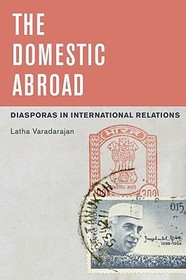
The Domestic Abroad
Diasporas in International Relations
-
10% KEDVEZMÉNY?
- A kedvezmény csak az 'Értesítés a kedvenc témákról' hírlevelünk címzettjeinek rendeléseire érvényes.
- Kiadói listaár GBP 78.00
-
37 264 Ft (35 490 Ft + 5% áfa)
Az ár azért becsült, mert a rendelés pillanatában nem lehet pontosan tudni, hogy a beérkezéskor milyen lesz a forint árfolyama az adott termék eredeti devizájához képest. Ha a forint romlana, kissé többet, ha javulna, kissé kevesebbet kell majd fizetnie.
- Kedvezmény(ek) 10% (cc. 3 726 Ft off)
- Kedvezményes ár 33 538 Ft (31 941 Ft + 5% áfa)
Iratkozzon fel most és részesüljön kedvezőbb árainkból!
Feliratkozom
37 264 Ft

Beszerezhetőség
Megrendelésre a kiadó utánnyomja a könyvet. Rendelhető, de a szokásosnál kicsit lassabban érkezik meg.
Why don't you give exact delivery time?
A beszerzés időigényét az eddigi tapasztalatokra alapozva adjuk meg. Azért becsült, mert a terméket külföldről hozzuk be, így a kiadó kiszolgálásának pillanatnyi gyorsaságától is függ. A megadottnál gyorsabb és lassabb szállítás is elképzelhető, de mindent megteszünk, hogy Ön a lehető leghamarabb jusson hozzá a termékhez.
A termék adatai:
- Kiadó OUP USA
- Megjelenés dátuma 2010. október 28.
- ISBN 9780199733910
- Kötéstípus Keménykötés
- Terjedelem256 oldal
- Méret 163x239x25 mm
- Súly 513 g
- Nyelv angol 0
Kategóriák
Rövid leírás:
In recent years, a significant number of developing nations have made moves to institutionalize their relationships with their transnational communities, re-conceiving diasporas as being part of a larger "global nation." This marks the rise of the "domestic abroad," or the reassertion of nationalist imaginary and state authority amid neo-liberal restructuring of states.
In Producing the Domestic Abroad, Latha Varadarajan proposes a re-consideration of both the meaning of transnationalism and the nature of national and state identity in global politics. In order to do this, she draws from two literatures that are rarely brought into conversation with IR scholarship: postcolonial theory and historical-materialism, developing her argument through an analysis of the post-1947 Indian state and the relationship between its emergent economic power and its diaspora.
Hosszú leírás:
In recent years, a significant number of developing nations have made moves to institutionalize their relationships with their transnational communities. This has occurred in a variety of ways: through new ministries for "diaspora affairs," through the granting of dual citizenship, the extension of voting rights to immigrants, and even through the creation of reserved seats in national legislatures. Such gestures re-conceive diasporas as being part of a larger "global nation," with all of the concomitant claims on institutional structures of the state. This marks a break from the past, when immigrants were ignored or denounced as traitors by their home state. It also marks the rise of what the author terms the "domestic abroad," or the reassertion of nationalist imaginary and state authority amid neo-liberal restructuring of states.
Latha Varadarajan argues that studies in transnationalism have heretofore failed to grasp the importance of such phenomena, due to the field's tendency to avoid the question of capitalism and focus on the undermining of state sovereignty and the building of global civil society. In Producing the Domestic Abroad, she proposes a re-consideration of both the meaning of transnationalism and the nature of national and state identity in global politics. In order to do this, Varadarajan draws from two literatures that are rarely brought into conversation with IR scholarship: postcolonial theory and historical-materialism. She develops her argument through an analysis of the post-1947 Indian state and its dynamic relationship to the groups constituted as the "Indian diaspora" especially in the context of the neoliberal restructuring of the Indian economy.
In recent years, numerous scholars have undertaken analyses of diasporas in international affairs. However, few bring the theoretical innovation or conceptual sophistication that Varadarajan displays here...Varadarajan offers a rich meticulously detailed illustration of the theory...In so doing, she provides the road map for future comparative empirical applications of the theory. An absolutely essential contribution. Summing Up: Essential.
Tartalomjegyzék:
Introducing the Domestic Abroad
Re-imagined Nations and Re-structured States: Explaining the Domestic Abroad
Putting the Diaspora in its Place: From Colonial Transnationalism to Postcolonial Nationalism
The Making and Unmaking of Hegemony: Indian Capitalism from Swadeshi to Swraj
From Indians Abroad to the Global Indian
Conclusion
Appendices
Notes
Index





